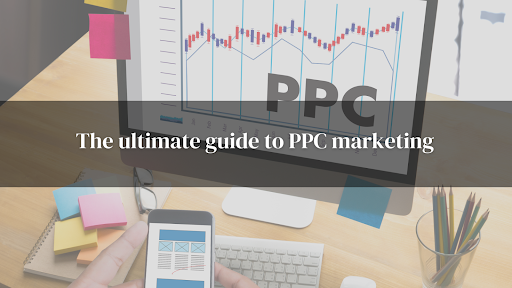The ultimate guide to PPC marketing

It's no secret that Google is the most competitive and powerful internet search engine.
It ranks at or near the top every single month. That's all thanks to the number of people who use their search engines daily.
But does this mean you should drop everything and start throwing all your efforts into Google AdWords? If so, not quite.
This article will give you an ultimate guide to PPC marketing, show you exactly how you can get started, and most importantly, help you choose the right plan for your specific business.
This article will discuss some of the basics of pay-per-click marketing, also known as PPC marketing.
What is PPC?

PPC stands for pay-per-click. It is a form of digital marketing in which marketers pay a fee each time a user clicks on one of their ads. The price they pay for this click is determined by various criteria, including the ad's quality and the keywords used in the ad. An advertiser will create an ad group for each sort of term under which they want their ad to appear. The ad group will have one or more advertisements.
Each advertisement will target a specific audience depending on age, gender, location, and others. The advertiser is charged a small fee for each click when a user clicks on the ad.
How to do keyword research for PPC
Keyword research is one of the most critical steps in launching a PPC campaign.
It is the first step in designing efficient advertisements and choosing the right keywords to target with your campaign. Ideally, it would help if you undertook keyword research before beginning to construct your campaign to structure your advertising around phrases most likely to resonate with your target audience and generate a high volume of clicks.
Even if you are not undertaking keyword research before beginning your campaign, it is still a good idea to understand which terms are likely to work best for your business to create successful ad campaigns.
The process of keyword research involves determining a list of relevant keywords relevant to your company's services or products and the target audience you are attempting to attract. To do efficient keyword research, you must undertake independent research to uncover standard search terms related to your business and the products and services you offer.

- Understand where your ideal customer hangs out online and their preferred communication method (e.g. Facebook, Instagram, Google, etc.)
- Create a buyer persona to understand your customers' pain points better and identify the most effective ways to reach them.
- Research your competition to identify potential targets for your advertising dollars.
- Conduct keyword research to identify the best possible keywords for your paid search campaigns.
6 things you should always do to improve your PPC marketing.
1. Set Goals
When planning your PPC campaign, you must have a precise aim. It will help you stay focused and measure your progress. Based on your objectives, set short-term and long-term goals. It will help you organize your campaign and assess its success. Your goals should be SMART (Specific, Measurable, Attainable, Relevant, and Time-Bound) and should help you achieve your business goals.
2. Know the Difference Between CPA & CPC
Pay-per-click advertising allows you to advertise on search engines like Google or Bing and only pay when someone clicks on your ad. This might be cost-per-click (CPC) or cost-per-action (CPA).
CPC charges you every time someone clicks on your ad, but CPA charges you only when someone acts on your advertisement, such as completing a purchase or subscribing to a service.
Understanding these two indicators' differences can help you decide which choice is best for your business.
3. Use a High-Quality Landing Page
A high-quality landing page will convert more visitors into leads and help in increasing conversion rates. When someone clicks on an ad, they will be taken to a landing page where they are prompted to take a particular action, such as making a purchase or signing up for your service. You can use tools such as Unbounce tools to help you improve the design of your landing pages and increase conversions.
4. Optimize Your Ad Text and Keywords
When writing your ad copy, consider your target audience and the keywords they will likely use while searching online. It increases the chances of your ad appearing higher in search results and driving visitors to your website.
It would help if you also optimized your advertising with relevant keywords to guarantee that you appear for the correct search terms. You may include keywords such as "computer accessories" or "computer accessories items" in your ad text so that people searching for these terms may easily find you. For example, offer computer accessories.
5. Target the Right Audience
You may target specific audiences to optimize your results when you create your advertising. For example, if you provide online courses, you may target students between the ages of 19 and 22 with ads giving discounts on these items. Targeting the proper demographic will help maximize your PPC advertising spend and increase site conversions.
6. Include a Call to Action
Once you have attracted visitors to your website, the next step is to encourage them to take the desired action. A good call to action can persuade your visitors to take a specific action, increasing sales for your company.
You may utilize a variety of rings for activities, such as "join up now," "purchase now," or "download now." Including a call to action button on your landing page is an innovative way to encourage your visitors to take action and increase your website's conversion rate.
Great job!
You have just learned about the complex world of PPC. Don't be confused by this significant traffic source because it's worth investing your money in. It is essential for business owners to know the best way to set up a pay-per-click campaign to obtain the desired outcomes from their advertising. Good luck with your first campaign, and remember to bookmark this guide.
Final Words
Savvy Martech provides PPC services, helping businesses reach their full potential through improved marketing and sales efforts. We utilize the latest tools and our understanding of technology to optimize your campaigns and achieve better results. For more details, please get in touch with us.
Cookies Consent
This website use cookies to help you have a superior and more relevant browsing experience on the website. Read more...